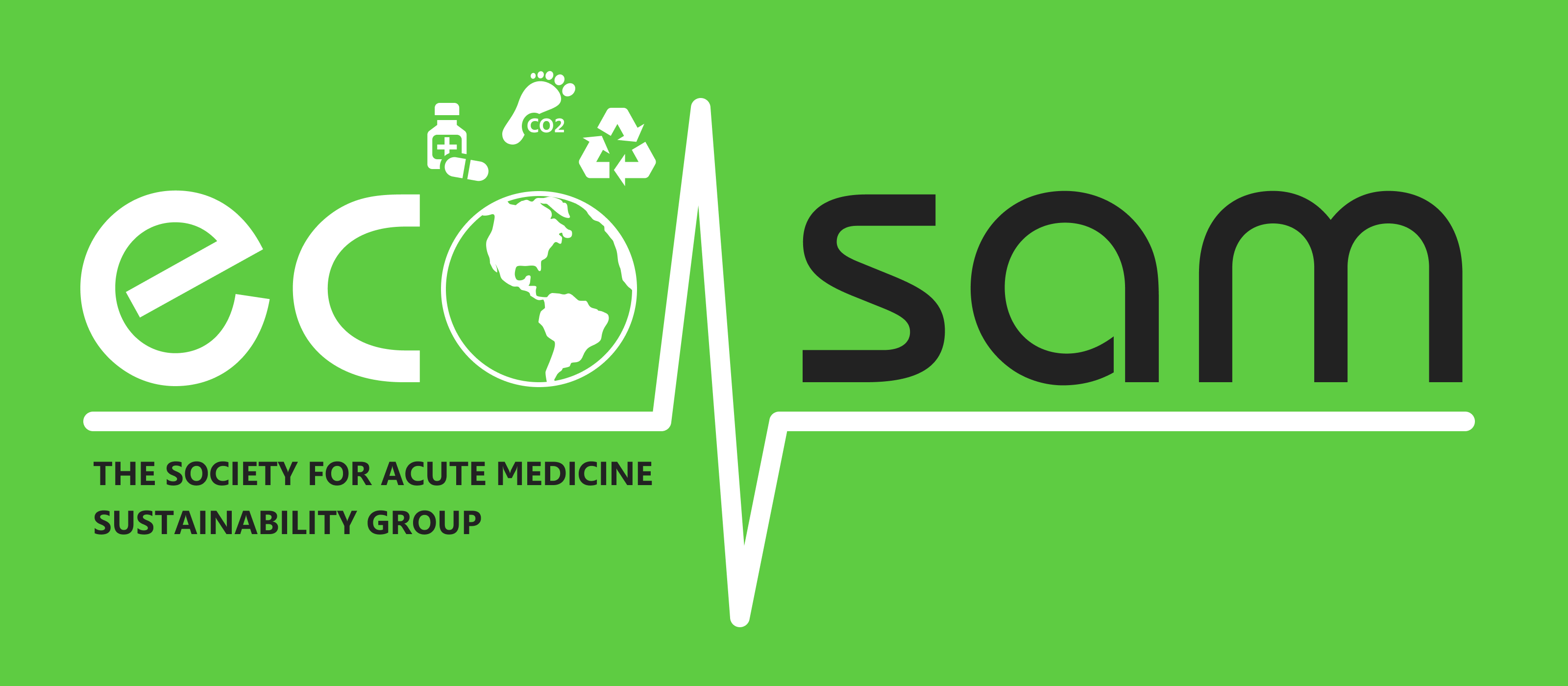Sustainability SIG
Eco SAM Lead Bio

Bethan Griffith is currently the lead for this growing group and took on leadership of ecoSAM from Vicky Price from October 2024.
Other sub-group committee members include
- Vicky Price - President Elect
- Natalie Beveridge - NW SAMbassador
- Minna Eii - AIM Pharmacist
- Ragit Varia - IT & Comms Lead
- Ekta Punj - Pharmacy Rep
- Jamie Phillips - AIM Registrar
- Georgia Galloway - AIM Registrar
- Caitlin Povey - AIM Registrar
- Keith MacPartland - AIM Registrar
How to join the SIG
If you wish to join this subgroup - please email SIG lead using the following form
Eco SAM Policy Statement
What is SAM doing?

Climate change is the greatest threat to global public health this century. Healthcare’s climate footprint has increased from 4.4% of net global emissions in 2014 to 5.2% in 2019[1]. As healthcare professionals, we can reduce the environmental impact of our work and advocate for environmentally sustainable changes to the wider healthcare system.
In 2022, the NHS became the first health system to embed net zero into legislation through the Health and Care Act 2022. The following policy documents highlight some of UK healthcare systems’ commitment in reducing their environmental impacts:
- *England - Delivering a ‘Net Zero’ National Health Service, 2020[2];
- Wales - NHS Wales Decarbonisation Strategic Delivery Plan, 2021[3];
- Scotland - NHS Scotland climate emergency and sustainability strategy: 2022-2026[4]
*Staff working in England should review their hospital’s Green Plans and contribute to their Trust’s strategic delivery of net zero aligned to local ICS commitments.
Understanding how Acute Medicine department can mitigate their environmental impacts while maintaining high quality standards of patient care within the current setting of financial and operational pressures is a challenge. SAM joins multiple other healthcare organisations in rising to this challenge to improve the health and wellbeing of individuals and communities whilst recognising that environmental, social, and economic sustainability are vital for achieving our mission and creating a healthier future.
With this in mind, SAM has made the following recommendations following the Centre for Sustainable Healthcare’s 4 principles of low carbon healthcare service delivery
[1] Momentum builds for health-care climate action - The Lancet
[2] Greener NHS » Delivering a net zero NHS (england.nhs.uk)
[3] NHS Wales decarbonisation strategic delivery plan | GOV.WALES
[4] Supporting documents - NHS Scotland climate emergency and sustainability strategy: 2022-2026 - gov.scot (www.gov.scot)
Climate change is an important challenge facing us all and in our role as healthcare professionals this is no different.
SAM are looking at ways of reducing their carbon footprint and also ways that we as healthcare professionals can in our day to day work.
Conferences and meetings
We will work with our conference team to reduce the impact where we can.
- Offering virtual attendance and evening webinars
- More plant based food options and looking to remove red meat
- Ensure that we liaise with conference venues regarding use of single use plastics and their carbon foot print
- Looking at locations chosen in terms of accessibility/ ease of use of public transport
SAM strategy
To look at the following
- A member of council who is nominally the climate change lead
- Education on climate change /sustainability in healthcare
- Podcast
- Presentations at conferences regularly (already presented at SAMLondon)
- Website information with links
- A SAM policy
Changes within Healthcare specific to Acute Medicine
A lot of organisations are looking at impact specifically linked to their specialty, such as gastro looking at endoscopy, Anaesthetics looking at impact of anaesthetic agents etc.
In terms of acute medicine we will explore ways that we can improve our carbon footprint within acute medicine
We will ask our members for suggestions in our newsletter / social media and then share ideas
** Hot Weather Health Plan **
The Society for Acute Medicine has produced the following guidance to support
clinicians working in acute services to:
- Work safely during hot weather conditions.
- Know who is at risk and adapt individual care plans to respond to hot weather.
- Be aware of medications that increase patient risk during hot weather.
- Know how to treat heat related illnesses including increased cardiovascular and
respiratory complications. - Be familiarised with the advice from public health to share with patients.
- Promote environmental and behavioural changes that could reduce the risk of hot
weather.
Sustainability CPD Resources
One of the aims of EcoSAM is to provide resources for SAM members to widen the breadth of their knowledge of sustainable healthcare, and even start a project of their own.
Sustainable healthcare is a growing topic with a large resource pool available. It can be tricky to know where to start!
Below are highlighted four resources which are freely available, and provide a good starting point on the road to providing sustainable healthcare.
You can use the Sustainability in Quality Improvement (SusQI) organisation’s handy step-by-step guide to develop a sustainability focused project of your own. It includes project development templates and planners, all to help you get started.
Events
Sustainability Events
Sorry, we couldn't find any posts. Please try a different search.
